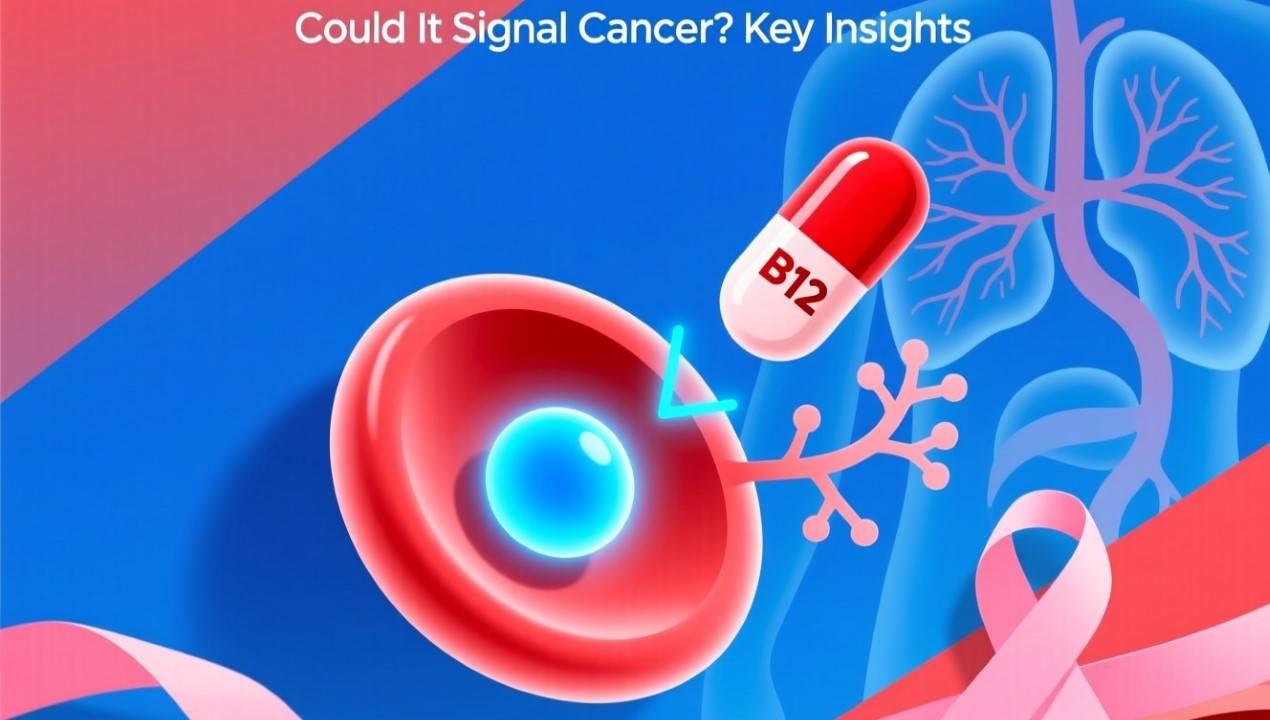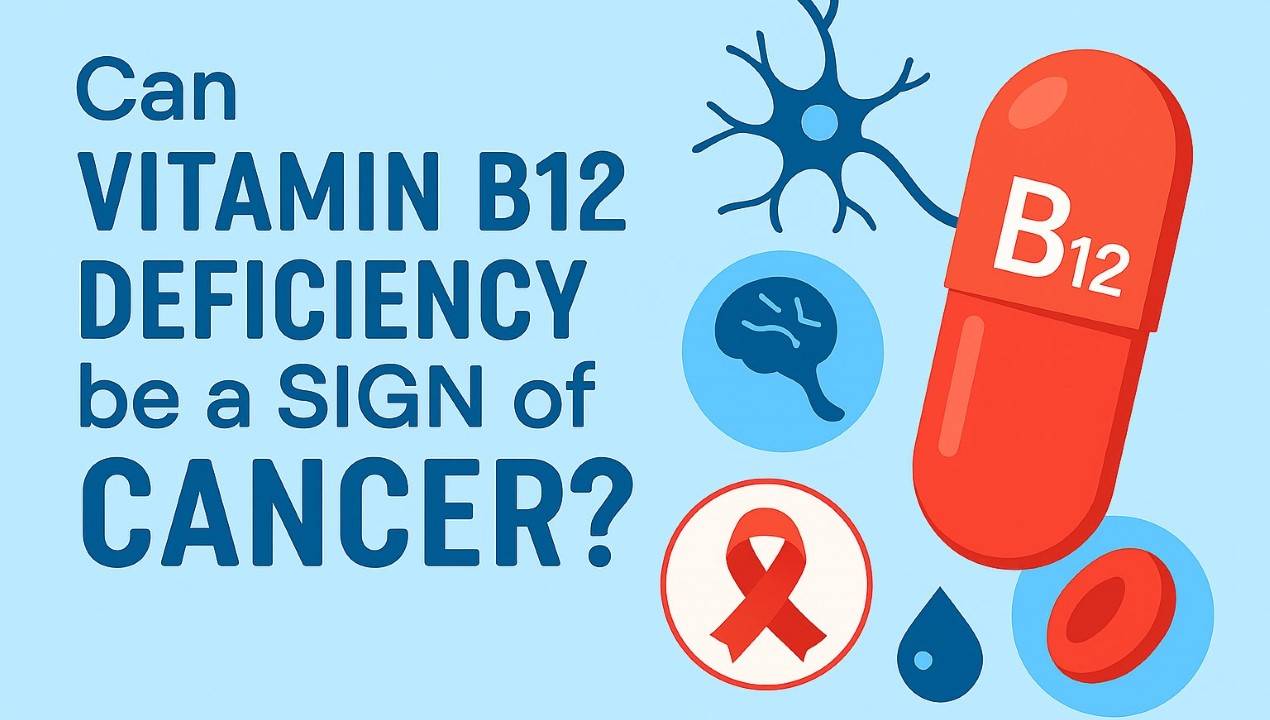Can vitamin B12 deficiency be a sign of cancer? This question might worry you if you’re feeling tired, weak, or foggy. Vitamin B12 is a vital nutrient that keeps your blood, nerves, and brain healthy. Deficiency can cause many symptoms, but could it also hint at something serious like cancer? In this article, we’ll explore the connection in simple words, share what to look for, and explain what to do next. Let’s dive in and ease your concerns!
What Exactly Is Vitamin B12 and Why Does Your Body Need It?
The Role of Vitamin B12
Vitamin B12 is like a superhero for your body. It helps make red blood cells, supports nerve health, and keeps your brain sharp. You get B12 from foods like meat, fish, eggs, and dairy. If you don’t have enough, you might feel tired or tingly. I’ve seen friends struggle with low energy, not knowing B12 was the issue.
Why You Might Lack B12
A vitamin B12 deficiency happens when your body doesn’t get or absorb enough B12. This can occur because of:
- Diet: Vegans or vegetarians may miss B12-rich foods.
- Stomach issues: Problems like gastritis block B12 absorption.
- Medications: Drugs like antacids or metformin can lower B12.
- Age: Older adults absorb less B12 over time.
Understanding these vitamin B12 deficiency causes helps you spot risks early.
Symptoms of Vitamin B12 Deficiency
Before we explore the cancer link, let’s look at low B12 symptoms. These signs can mimic other health issues, so pay attention:
- Tiredness: Feeling exhausted even after rest.
- Tingling: Pins-and-needles in hands or feet (B12 deficiency tingling).
- Brain fog: Trouble focusing or remembering (vitamin B12 and memory loss).
- Pale skin: A sign of vitamin B12 anemia symptoms.
- Mood changes: Feeling sad or anxious.
- Weakness: Muscles feel heavy or weak.
- Mouth pain: Sore or red tongue.
I’ve noticed these in people who didn’t suspect low B12. If you have these, a simple test can check your levels.
Can Vitamin B12 Deficiency Be a Sign of Cancer?

Exploring the Connection
So, can vitamin B12 deficiency be a sign of cancer? The answer isn’t simple, but let’s break it down. A B12 deficiency doesn’t directly cause cancer. However, some cancers or related conditions can lead to low B12. For example:
- Stomach cancer: It can damage cells that help absorb B12, causing a vitamin B12 shortage and cancer.
- Blood cancers: Leukemia or lymphoma might affect red blood cell production, mimicking vitamin B12 anemia symptoms.
- Autoimmune issues: Conditions like pernicious anemia, linked to low B12, may raise cancer risk slightly.
I’ve read studies showing that low B12 can sometimes be a clue to underlying issues. But don’t panic, most B12 deficiencies are not cancer-related.
When to Worry
Vitamin B12 deficiency and cancer risk are rare. Low B12 is more often caused by diet or absorption problems. However, if you have low vitamin B12 warning signs plus other symptoms like:
- Unexplained weight loss
- Constant pain
- Lumps or swelling
- Night sweats
Talk to a doctor. These could point to B12 deficiency related to cancer. I’ve seen how early testing can bring peace of mind.
Why Cancer Might Cause Low B12
How Cancer Affects B12 Levels
Certain cancers can interfere with B12. Here’s how:
- Stomach or intestinal cancer: These can damage areas that absorb B12.
- Blood cancers: They disrupt blood cell production, causing B12 deficiency health concerns.
- Chemotherapy: Some treatments lower B12 absorption.
I’ve heard from friends who found low B12 during cancer treatment. It’s not common, but it’s worth checking.
Other Conditions to Consider
Not all B12 deficiencies mean cancer. Pernicious anemia symptoms, for example, can cause low B12 without cancer. This autoimmune condition stops your body from absorbing B12. Other issues like Crohn’s disease or celiac disease can also lower B12. Always ask your doctor to rule out causes.
How to Check for Vitamin B12 Deficiency
Getting Tested
Wondering about a vitamin B12 deficiency diagnosis? A blood test is the best way to check B12 levels. Your doctor might also test for:
- Anemia (linked to vitamin B12 anemia signs).
- Homocysteine or MMA levels (high levels suggest low B12).
- Underlying conditions like pernicious anemia.
I’ve seen how a quick test can clarify things. If you have symptoms of low B12 and cancer concerns, ask for a full checkup.
Can You Test at Home?
Some home kits let you collect a blood sample and send it to a lab. They’re handy but not as accurate as a doctor’s test. I tried a home kit once—it was easy, but I confirmed with a doctor for certainty. If you notice B12 deficiency symptoms in adults, see a professional.
Treating Vitamin B12 Deficiency
Boosting B12 Levels
Fixing a vitamin B12 deficiency is usually simple. Here are common ways:
- Diet: Eat B12-rich foods like eggs, fish, meat, or fortified cereals.
- Supplements: B12 pills, gummies, or sprays work well. I like gummies because they’re tasty and easy.
- Shots: If absorption is an issue, B12 shots deliver it straight to your blood.
- Treat underlying issues: For example, pernicious anemia needs special care.
I’ve seen friends feel better in weeks with supplements. Talk to your doctor for the best plan.
When Cancer Is Involved
If a deficiency is linked to cancer, treatment focuses on both. For example, treating stomach cancer might improve B12 absorption. I’ve read about cases where fixing B12 helped patients feel stronger during cancer care. Always follow your doctor’s advice.
Preventing Low Vitamin B12 Warning Signs
Stay Ahead of Deficiency
To avoid vitamin B12 deficiency health concerns, try these:
- Eat B12-rich foods daily.
- Take a multivitamin with B12, especially if you’re vegan.
- Get regular blood tests if you’re at risk.
- Ask about medicines that lower B12.
I’ve seen how small habits prevent big issues. A little effort goes a long way!
Monitor for Cancer Risks
While vitamin B12 and cancer are rare, they stay proactive. Watch for unusual symptoms like weight loss or lumps. Regular checkups catch problems early. I’ve noticed people feel better knowing they’re in control of their health.
When to See a Doctor for Low Vitamin B12
You should see a doctor if you notice:
- Ongoing fatigue or weakness
- Numbness or tingling in your hands or feet
- Trouble with memory or focus
- Unexplained weight loss
- Rapid heartbeat
Doctors can test your blood for B12 levels and check if symptoms point to B12 deficiency health concerns or something more serious
FAQs About Can Vitamin B12 Deficiency Be a Sign of Cancer
What Happens When My Vitamin B12 Is Low?
Low B12 causes tiredness, B12 deficiency tingling, brain fog, and pale skin. It affects blood and nerve health. In rare cases, it might hint at vitamin B12 deficiency and cancer risk. A doctor can test and treat it easily.
What Are the 4 Stages of B12 Deficiency?
- Early stage: B12 levels drop, but symptoms are mild.
- Mild deficiency: You notice early symptoms of vitamin B12 deficiency, like fatigue.
- Moderate deficiency: Symptoms like tingling or vitamin B12 deficiency and memory loss worsen.
- Severe deficiency: Serious issues like nerve damage or B12 deficiency related to cancer appear.
Early action prevents worse problems. [Note: Numbered list aids readability.]
What Is Clinically One of the First Signs of Vitamin B12 Deficiency?
Fatigue is often the first sign. You feel tired despite rest because of vitamin B12 anemia symptoms. If this sounds familiar, get tested.
How Can I Check My B12 Level at Home?
Home test kits let you collect a blood sample for lab analysis. They’re useful but less accurate than a doctor’s test. For low vitamin B12 warning signs, see a doctor for a full check. I’ve seen home tests help, but professionals are best.
Final Thoughts
Can vitamin B12 deficiency be a sign of cancer? But rare. Most deficiencies come from diet or absorption issues, not cancer. Watch for vitamin B12 deficiency signs like tiredness, tingling, or brain fog. If you’re worried about cancer, look for other signs like weight loss and see a doctor.
I’ve seen how a simple blood test can ease fears and start treatment. Take charge of your health today, your body deserves it!

Adel Galal is a health and wellness writer with over 30 years of experience studying and writing about health, fitness, nutrition, and healthy living. He is the founder of NextFitLife.com, where he shares practical, evidence-based guidance to support long-term health at any age. Adel’s mission is simple:
to help people make smarter health choices that fit real life, at any age.



